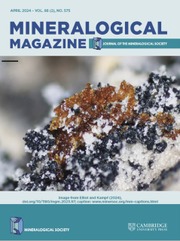Article contents
On the symmetry of tsumcorite group minerals based on the new species rappoldite and zincgartrellite
Published online by Cambridge University Press: 05 July 2018
Abstract
Rappoldite, the Co-analogue of helmutwinklerite, and zincgartrellite, the Zn-dominant analogue of gartrellite, are two new members of the tsumcorite group. Both minerals are triclinic, their structures are closely related to the parent structure, i.e. the ‘tsumcorite type’ (C2/m, Z = 2). The lower symmetry is caused by two different crystal-chemical requirements. Order phenomena of the hydrogen bonds cause the ‘helmutwinklerite type’ (P1̄, Z= 4), ordering of Cu2+and Fe3+ is responsible for the ‘gartrellite type’ (P1̄, Z = 1).
Rappoldite was found on samples from the Rappold mine near Schneeberg, Saxony, Germany. The new species forms red to red-brown prismatic and tabular crystals up to 1 mm long. Dcalc. = 5.28 g/cm3. 2Vz = 85(5)°, nx = 1.85 (calc.), ny = 1.87(2) and nz = 1.90(2); dispersion is distinct with r > v; orientation is Y ∼∥ [1̄ 20] and X ∼ ∥ c. The empirical formula derived from electron microprobe analyses is (Pb1.01Ca0.01)Σ1.02(Co0.99Ni0.62Zn0.35Fe0.02)Σ1.98[(AsO4)1.99(SO4)0.01]Σ2.00[(OH)0.02(H2O)1.98]Σ2.00 or Pb(Co,Ni)2(AsO4)2·2H2O. Single-crystal X-ray studies showed average C2/m symmetry. Weak superstructure reflections are responsible for triclinic symmetry and enlarged cell metrics (refined from powder data): a= 11.190(2)Å, b= 10.548(2)Å, c= 7.593(1)Å, α = 100.38(1)8, β = 109.59(2)8, γ = 98.96(1)8, V= 807.6 Å3, Z= 4. The superstructure results from the hydrogen-bond scheme, but faint streaks indicate some disorder. All investigated rappoldite crystals are twinned by reflection on (23̄0) which corresponds to the mirror plane of the average C2/m cell. Helmutwinklerite is isotypic with rappoldite and probably also with pure thometzekite; sulphatian thometzekite is monoclinic.
Zincgartrellite forms green-yellow rosette-like aggregates on samples from the Tsumeb mine, Namibia. The Dcalc. = 5.30 g/cm3. 2Vx = 87(5)°, nx = 1.91(2), ny = 1.94 (calc.) and nz = 1.97(2). Electron-microprobe analyses and Mössbauer data yielded the empirical formula (Pb0.97Ca0.04)Σ1.01(Zn0.91Cu0.51Fe0.59Al0.03)Σ2.04[(AsO4)1.96(SO4)0.01]Σ1.97[(OH)0.81(H2O)1.31]Σ2.12 or Pb(Zn,Fe,Cu)2(AsO4)2(H2O,OH)2. The structural formula is Pb(ZnxFe1–x)(ZnxCu1–x)(AsO4)2(OH)1–x(H2O)1+xwith 0.4 < x < 0.8. Gartrellite is defined by x < 0.4. Helmutwinklerite has x near to 1 and is defined by a cell with fourfold volume. Single-crystal X-ray studies of zincgartrellite proved space group P1̄ caused by ordering of Fe3+ and Cu at one atomic site. Cell parameters (refined from powder data): a= 5.550(1)Å, b= 5.620(1)Å, c= 7.621(1)Å, α = 68.59(1), β = 69.17(1), γ = 69.51(1)°, V= 200.1 Å3, Z= 1.
Keywords
- Type
- Research Article
- Information
- Copyright
- Copyright © The Mineralogical Society of Great Britain and Ireland 2000
References
- 5
- Cited by


